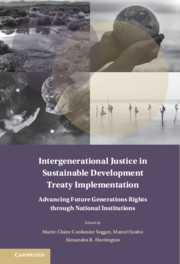 Intergenerational Justice in Sustainable Development Treaty Implementation
Intergenerational Justice in Sustainable Development Treaty Implementation from National Case Studies
Published online by Cambridge University Press: 15 October 2021
Intergenerational equity is directly linked to sustainable development and environmental issues and is committed to equity for future generations. In this regard, land stewardship has many implications for the protection, sustainable use, and degradation or restoration of the environment. Poverty can lead to unbalanced natural ecosystems, loss of diversity, and large-scale deforestation. These factors can have a direct impact on natural resources and are mainly caused by poverty and outmigration. It has also been suggested that in certain situations, damage to the local environment cannot be effectively ceased unless rural livelihood disputes are suitably addressed, and these should be made with an approach that focuses primarily on delivering support for sustainable livelihoods through long-term plans. This is essential to current and future generations, and, as a corollary, to the concept of intergenerational equity.
To save this book to your Kindle, first ensure [email protected] is added to your Approved Personal Document E-mail List under your Personal Document Settings on the Manage Your Content and Devices page of your Amazon account. Then enter the ‘name’ part of your Kindle email address below. Find out more about saving to your Kindle.
Note you can select to save to either the @free.kindle.com or @kindle.com variations. ‘@free.kindle.com’ emails are free but can only be saved to your device when it is connected to wi-fi. ‘@kindle.com’ emails can be delivered even when you are not connected to wi-fi, but note that service fees apply.
Find out more about the Kindle Personal Document Service.
To save content items to your account, please confirm that you agree to abide by our usage policies. If this is the first time you use this feature, you will be asked to authorise Cambridge Core to connect with your account. Find out more about saving content to Dropbox.
To save content items to your account, please confirm that you agree to abide by our usage policies. If this is the first time you use this feature, you will be asked to authorise Cambridge Core to connect with your account. Find out more about saving content to Google Drive.